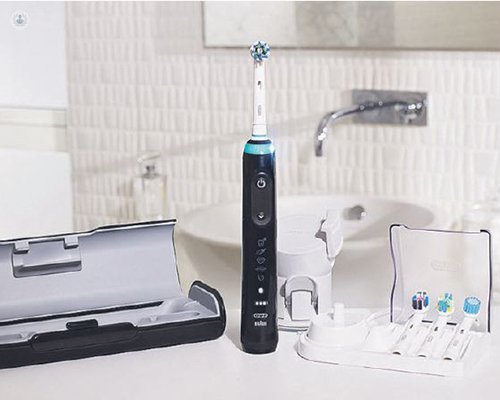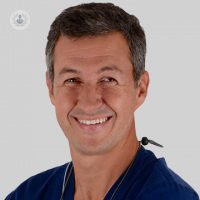New in oral hygiene
Written by:Proper oral hygiene is the key to proper maintenance of the health of our teeth and gums. The threat in the form of plaque puts us at risk of tooth decay, gingivitis, periodontitis, and even increase the risk of other general diseases. Oral B, the most recommended brand by dentists in Spain, began its work in the middle of the last century with the aim of providing patients with the best tools to achieve adequate oral hygiene. In line with this effort and continuous progress, Oral B presented last February at the Mobile World Congress in Barcelona its latest innovation in electric brushing; the first smart brush that sees what the patient does not see: Oral B GENIUS. The dr. Nart, a dentist specializing in periodontics and implants, of recognized national and international prestige, has had the opportunity to test Oral B GENIUS personally and in his patients:
To brush there are many brushes of different types: manual, electric, hard, soft, etc.. Can you give us your point of view on what would be the ideal tool to use at home?
Indeed there are brushes on the market with a multitude of different designs, shapes, sizes and consistencies. Within which each will try to meet the specific needs that some patients may have, roughly the brushes must meet the following requirements: small head, to be able to clean the areas of more difficult access, medium hardness, to achieve an optimal balance between plaque removal efficiency and potential damage to the gums. Within the various types of brush, the current scientific publications of greater impact and prestige clearly show a higher cleaning efficiency of the electric brushes compared to the manual ones. And within them, those with round head and movement in the three directions of space (oscillation-rotation-pulsation) are the ones that provide the most evidence.
Dr. Nart, to what extent does good oral hygiene affect the health of our mouths? Is it really so important to brush and use toothpaste 2-3 times a day?
In the mouth, more than 600 species of bacteria. Some of these are the cause of caries, gingivitis, periodontitis, halitosis and also mucositis and periimplantitis around dental implants. I usually tell my patients not to invest time and money in a dental treatment but there is good oral hygiene on their part, as we know that the treatment will fail in great measure over time. Brushing twice a day is necessary to exert a control and elimination of the bacteria located on the teeth, gingiva and dorsum of the tongue. In addition we must complete the oral hygiene between the teeth with dental tape or interdental brushes.
Recently initiatives such as the Partnership for Health, led by SEPA, have been published that aim to raise awareness about the interrelationship between general and oral diseases and vice versa. To what extent does this relationship affect our daily lives? Or is it just a more theoretical relationship?
In May 2016, the Spanish Society of Periodontics established a pioneering cooperation agreement between different medical societies that has proven to be closely related to oral pathology.
Thus, for many years, periodontitis has been linked to diabetes, so that diabetic patients are more susceptible to developing periodontitis. And vice versa, the treatment of advanced periodontitis helps to better control blood sugar.
More recently, bacteria from the mouth have been isolated from the atherosclerotic plaque responsible for ischemic heart disease; angina, infarction, thrombosis ... Although its role in this pathology is not clear yet, it seems clear that those patients with a risk of stroke or obstruction of coronary arteries (smoking, hypertensive, obese ...) if they do not control their oral hygiene and periodontitis and inflammation in the mouth will increase the chances of these serious and threatening diseases.
Finally, there is evidence that poor hygiene control resulting in gum disease (gingivitis, periodontitis) may increase the risk of preterm birth or the birth of underweight children, in addition to aspiration pneumonias.
More recent research has shown this relationship between gum disease and increased risk of other systemic diseases. The dental clinic can become a primary prevention area, working together with cardiologists, endocrinologists, pulmonologists, gynecologists and primary care physicians.
Then poor oral hygiene puts us at risk of problems in the mouth and could in other organs. What are the keys to good brushing?
As we have said before, the first thing is to have an effective tool, as demonstrated by the electric-oscillatory-pulsatile electric brush (Oral B Professional). With this tool in hand, the most critical point is to control the time and pressure with which we support the brush on the teeth. Of course a certain force is necessary, but from a certain threshold, the force only translates into damage. For this reason, Oral B Professional brushes incorporate a pressure control that indicates to the patient that it is being exceeded in a visual, tactile and auditory way. And finally, we have to make sure that we brush all the teeth and for a sufficient time. For this, the electric brushes incorporate a timer, but Oral B goes beyond. In short, effective tools, adequate technique and good compliance (time and access to all areas of the mouth) ... this being something that sometimes dental professionals do not get 100%.
Is Oral B GENIUS the brush that will make it easier for patients to brush as their dentist recommends?
Oral B GENIUS is the most advanced dental brushing tool. In line with the "connected" mart world in which we currently live and has invaded the health sciences and patient care, Oral B has managed to combine the excellent capabilities of its electric brushes with innovations in terms of recognition facial. The brush incorporates a system of position register that transmits to the SmartPhone through a connection
Bluetooth. In turn, the phone using the Oral B App application and the front camera will recognize the position of the patient's mouth. By combining the information received on the position of the brush and on the position of the patient's face, the application shows in real time to the patient which areas have been brushed for sufficient time and which do not. In this way, the patient will be sure to have brushed all areas of his mouth at the end of brushing.
Oral B GENIUS allows the patient to brush as recommended by his dental professional Oral B, with his brush Oral B GENIUS, is at the forefront of oral hygiene.
As a specialist in implants and since implants are for life, hygiene will not be such a major concern. This is true?
Hygiene is always fundamental, even if the patient no longer has any teeth. It is essential to prevent caries and diseases of the gums (gingivitis and periodontitis), as both are of bacterial origin. But since an implant is merely an artificial substitute for a dental root, the hygiene of a patient with implants is imperative to avoid peri-implantitis.
Periimplantitis is a consequence of the invasion of the surface of the implant by the bacteria of the mouth. As with caries and periodontitis, peri-implantitis can lead to the loss of an implant. But unlike teeth, the implants appear to be more susceptible to inflammation. Hence the hygiene of patients with implants should be even more exquisite.
If the implant patient has good hygiene, is not a smoker, their periodontitis is treated and attends professional maintenance every six months, the implants will last with health in the vast majority of cases. Prevention and hygiene are essential to prevent infections of dental implants.



